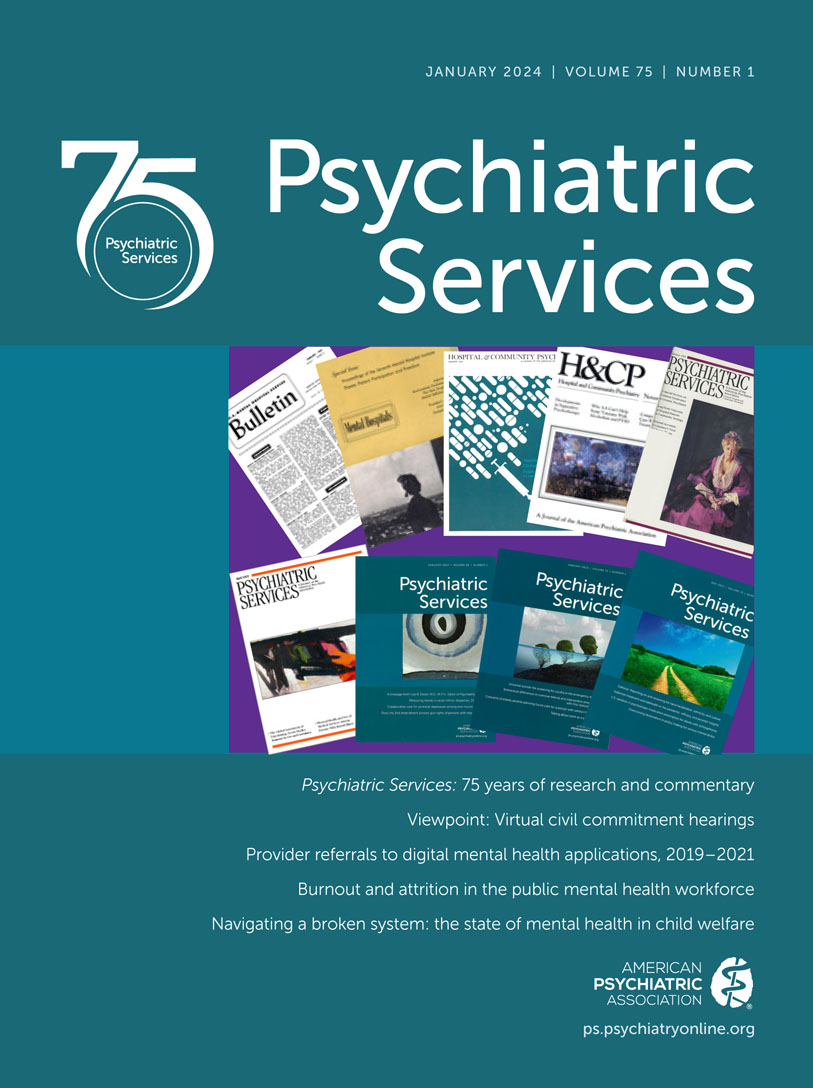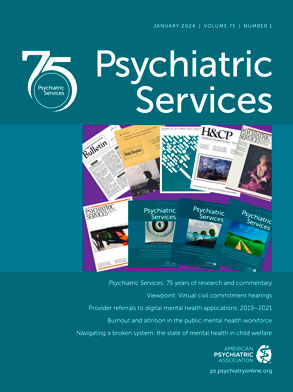This Editor’s Choice collection and others are available online in the Editor’s Choice section of ps.psychiatryonline.org. Carrie Cunningham, M.D., M.P.H., Nicole Kozloff, M.D., M.S., and Andrew Carlo, M.D., M.P.H., are editors of the topic collections.
The legal aims of the correctional system are to protect the community and to punish, deter, and offer rehabilitation to the offender. These goals may be at odds with the aims of psychiatric providers working in such settings. Consequently, jails and prisons can be challenging settings for the provision of mental health services for patients, providers, and the correctional staff. Even so, encounters with the criminal justice system can create opportunities for individuals with a severe mental illness, a substance use disorder, or both to obtain needed treatment that may otherwise be unavailable or difficult to access or that an individual would not choose to pursue in the community. With the development of diversion models and community-based forensic programs, such patients now have access to unique treatment strategies addressing concomitant legal and mental health needs.
This collection provides an update regarding correctional mental health care. The provision of mental health services within correctional environments continues to pose unique challenges, such as limited access to medications that are readily available in the community. Diversion programs that transition justice-involved individuals with mental illness from traditional criminal justice pathways toward treatment may reduce the burden of severe mental illness within correctional facilities and the risks to patients in such settings. At the same time, patients may be hesitant to engage in systems that they perceive to be coercive or overbearing. Innovations in meeting the mental health needs of incarcerated and justice-involved patients remain vital due to the ongoing high prevalence of mental illness and barriers to care faced by these populations.
Overview
Drivers of County Engagement in Criminal Justice–Behavioral Health Initiatives
Cuellar AE, Ramezani N, Bruno A, et al.
Psychiatr Serv 2022; 73(6):709–711
Prevalence of Mental Health Needs, Substance Use, and Co-occurring Disorders Among People Admitted to Prison
Butler A, Nicholls T, Samji H, et al.
Psychiatr Serv 2022; 73(7):737–744
Mental Health Services in a U.S. Prison During the COVID-19 Pandemic
Burton PRS, Morris NP, Hirschtritt ME
Psychiatr Serv 2021; 72(4):458–460
Differential Incarceration by Race-Ethnicity and Mental Health Service Status in the Los Angeles County Jail System
Appel O, Stephens D, Shadravan SM, et al.
Psychiatr Serv 2020; 71(8):843–846
Treatment in Custody
A Legal Right to Clozapine Therapy for Incarcerated Individuals with Treatment-Resistant Schizophrenia
Zarzar TR, Williams JB, Pruette ME, et al.
Psychiatr Serv 2021; 72(4):482–484
Clinical Outcomes of Specialized Treatment Units for Patients with Serious Mental Illness in the New York City Jail System
Ford EB, Silverman KD, Solimo A, et al.
Psychiatr Serv 2020; 71(6):547–554
Ending Restrictive Housing in Prisons for People With Mental Disorders
Barksy BA
Psychiatr Serv 2022; 73(4):463–466
Grave Disability in U.S. Jails and Prisons
Morris NP, Binder RL
Psychiatr Serv 2022; 73(5):577–579
Litigation Over Sleep Deprivation in U.S. Jails and Prisons
Morris NP, Holliday JR, Binder RL
Psychiatr Serv 2021; 72(10):1237–1239
Diversion and Community Treatment for Justice-Involved Individuals with Mental Illness
A New Commitment Pathway for Offenders With Serious Mental Illness: Expedited Diversion to Court-Ordered Treatment
Hoge SK, Bonnie RJ
Psychiatr Serv 2021; 72(8):969–971
Lessons in “Slow” Engagement from Staff and Administrators at a Prebooking Jail Diversion Program
Myers N, Hutnyan M, Wright G, et al.
Psychiatr Serv 2022; 73(10):1117–1122
Affordability of Forensic Assertive Community Treatment Programs: A Return-on-Investment Analysis
Maeng D, Tsun Z-Y, Lesch E, et al.
Psychiatr Serv 2023; 74(4):358–364
Benefits and Drawbacks of Police Integration Into Assertive Community Treatment Teams
Costigan CL, Woodin EM, Duerksen KN, et al.
Psychiatr Serv 2022; 73(4):447–455
Barriers to and Facilitators of Implementing Peer Support Services for Criminal Justice-Involved Individuals
Adams WE, Lincoln AK
Psychiatr Serv 2021; 72(6):626–632
Using Medicaid Coverage to Improve Peer Support and Other Services for Incarcerated Persons With Mental Illness
Swartz MS, Carlo AD, Brinkley A
Psychiatr Serv 2021; 72(6):621–622

